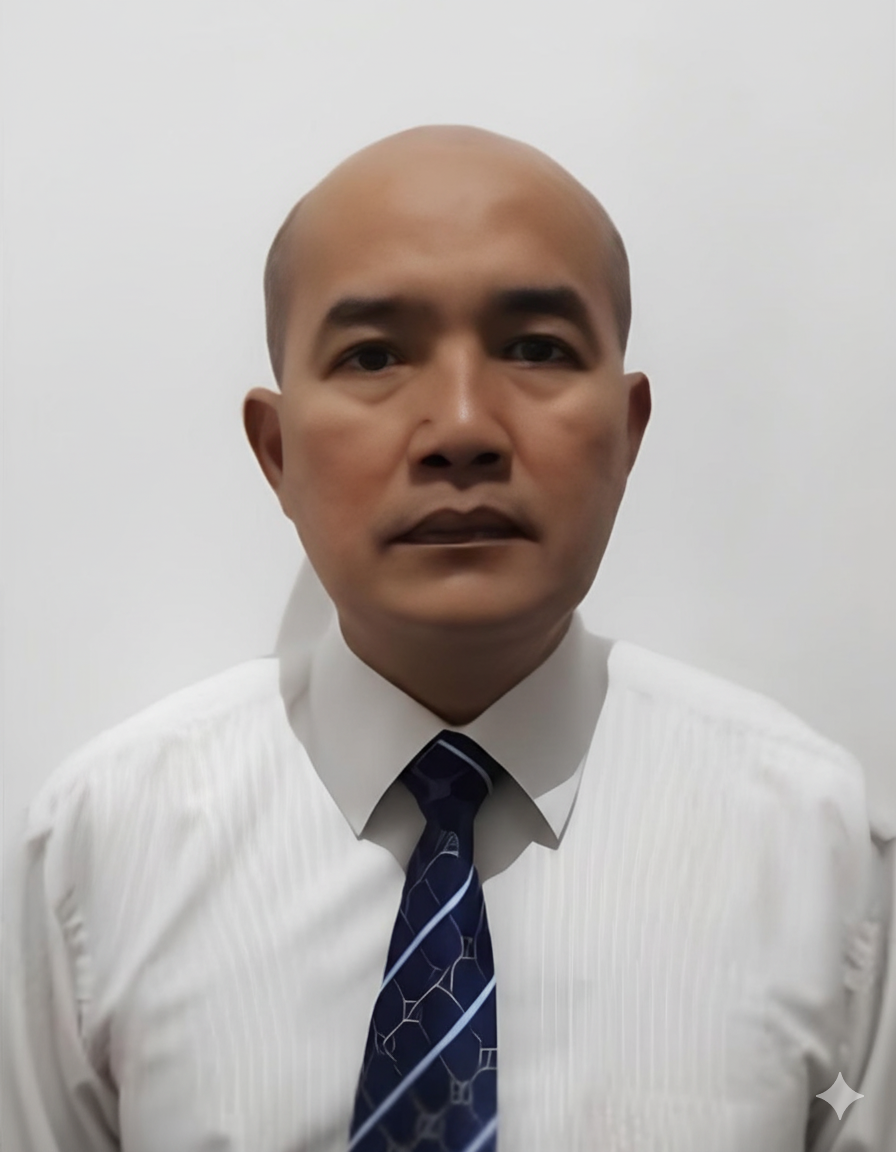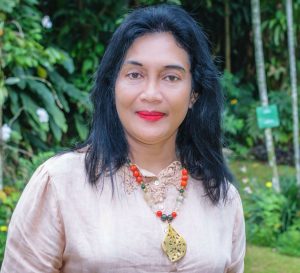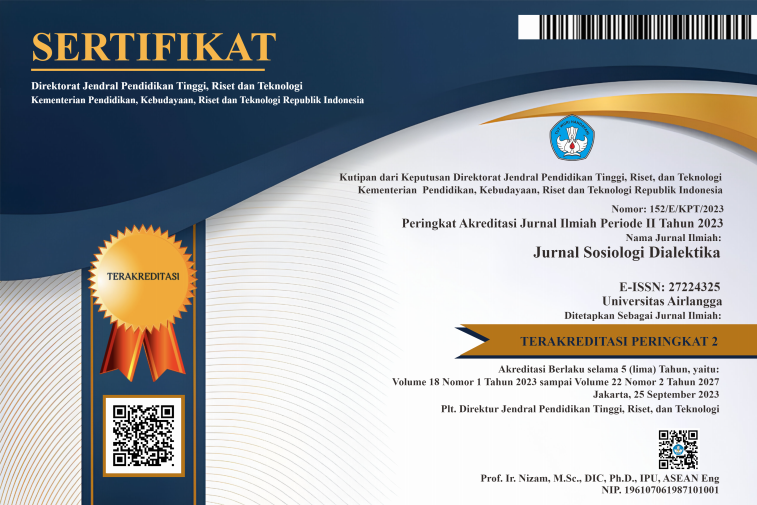Actualizing a friendly environment for Teman Tuli and Teman Dengar through the education sector
Downloads
Until now, the distribution of Special Schools (SLB) in Indonesia is still considered uneven and does not have adequate quality education or tends to stagnate. This condition is exacerbated by the COVID-19 pandemic, which encourages people with disabilities, especially the Teman Dengar and Teman Tuli communities to conduct online learning activities through video and audio. In line with this, this study seeks to provide steps that can be a solution in creating a friendly environment for people with disabilities, especially for the Teman Dengar and Teman Tuli both in the short and long term through the education sector. In explaining this, this study uses a qualitative method with the Van Kaam data analysis method through the interpretation of primary data from interviews which is expanded through secondary data from literature studies. Based on the data obtained, this study found that the stigma from the community who views the disabled group as a group that has lower quality and does not require higher education is an important factor inhibiting the creation of a friendly environment for disabled groups, especially for the Teman Dengar and Teman Tuli in Indonesia. This study concludes that a friendly environment for persons with disabilities is needed, including in the field of education, such as the use of SIBI and BISINDO in the general education curriculum.
AIDRAN (2020) Impact of Coronavirus pandemic on people with disabilities is discussed at the Indonesia project's global webinar series. AIDRAN, 24 June. [Accessed 06 February 2022]. https://aidran.org/2020/07/01/impact-of-coronavirus-pandemic-on-people-with-disabilities-is-discussed-at-the-indonesia-projects-global-webinar-series-24-june-2020/.
Alfianty D, Thohari S, Rahajeng UW, Firmanda TH, Mahalli, & Semedhi BP (2020) Akomodasi yang Layak bagi Siswa dengan Disabilitas di Masa Pandemi: Pengalaman Mengajar Guru Belajar dari Rumah. Malang: Australia-Indonesia Disability Research and Advocacy Network.
Anderson J & Eppard J (1998) Van Kaam's method revisited. Qualitative Health Research 8 (3):399-403. https://doi.org/10.1177/104973239800800310.
Darma IP & Rusyidi B (2015) Pelaksanaan sekolah inklusi di Indonesia. Prosiding Penelitian dan Pengabdian kepada Masyarakat 2 (2):223-227.
Drigas AS, Kouremenos D, & Vrettaros J (2005) An e-learning system for the deaf people. ITHET 6th Annual International Conference, July 7-9.
Gayatri IAM (2019) Analisis wacana kritis kebinekaan bahasa isyarat dalam pendidikan bahasa Indonesia pada komunitas tuli dan SLB. [Accessed 06 February 2022]. http://repositori.kemdikbud.go.id/20235/14/13.%20Makalah%20Ida%20Ayu%20Made%20Gayatri.pdf.
Goffman E (1963) Stigma: Notes on the Management of Spoiled Identity. Englewood Cliffs: Prentice-Hall.
Gunawan I (2021) Tak miliki penerjemah, Teman Tuli kesulitan belajar daring. Jawa Pos, 02 March. [Accessed 09 February 2022].
Irdamurni & Taufan J (2019) Implementation of speech to-text application for deaf students on inclusive education course. Journal of ICSAR 3 (2):38-40.
Jauhari A (2017) Pendidikan inklusi sebagai alternatif solusi mengatasi permasalahan sosial anak penyandang disabilitas. Jurnal IJTIMAIYA 1 (1):23-38.
Jaya I & Tarjiah I (2019) Modul PPG Program Studi PLB. Jakarta: Kementerian Pendidikan dan Kebudayaan.
Kemdikbud (2014) Paparan Wakil Menteri Pendidikan dan Kebudayaan R.I Bidang Pendidikan. Konsep dan Implementasi Kurikulum 2013. [Accessed 09 February 2022]. https://www.kemdikbud.go.id/kemdikbud/dokumen/Paparan/Paparan%20Wamendik.pdf.
Kemdikbud (2020) Statistik Per Sekolah SLB 2019/2020. Tangerang: Pusdatin Kemdikbud.
Kustiani R (2020) Universitas ini jadi contoh buka akses calon mahasiswa difabel. Tempo.co, 28 February. [Accessed 12 September 2021]. https://difabel.tempo.co/read/1313235/universitas-ini-jadi-contoh-buka-akses-calon-mahasiswa-difabel/full&view=ok.
Lackaye T & Margalit M (2006) Comparisons of achievement, effort, and self-perceptions among students with learning disabilities and their peers from different achievement groups. Journal of Learning Disabilities 39 (5):432-446.
Lemhanas (2020) Pelaksanaan e-learning guna cegah COVID-19. Lemhanas, 23 March. [Accessed 09 Februari 2022]. http://www.lemhannas.go.id/index.php/berita/berita-utama/815-pelaksanaan-e-learning-guna-cegah-covid-19.
Lenaini I (2021) Teknik pengambilan sampel purposive dan snowball sampling. Jurnal Kajian, Penelitian & Pengembangan Pendidikan Sejarah 6 (1):33-39.
Lintangsari AP (2020) Deaf students demand rights as a minority language group. Indonesia at Melbourne. [Accessed 10 February 2022]. https://indonesiaatmelbourne.unimelb.edu.au/deaf-students-demand-rights-as-a-minority-language-group/.
Nasir SA & Jayadi A (2021) Penerapan hak aksesibilitas bagi penyandang disabilitas perspektif hukum positif dan hukum Islam di Kota Makassar. Shautuna 2 (1):186-199.
Ndaumanu F (2020) Hak penyandang disabilitas: Antara tanggung jawab dan pelaksanaan oleh pemerintah daerah. Jurnal HAM 11 (1):131-150.
Nilawaty C (2018) Alasan SLB tetap jadi rujukan anak berkebutuhan khusus. Tempo.co, 14 July. [Accessed 13 February 2022]. https://difabel.tempo.co/read/1106739/alasan-slb-tetap-jadi-rujukan-anak-berkebutuhan-khusus/full&view=ok.
Olyvia F (2017) Satu juta anak berkebutuhan khusus tidak bisa sekolah. CNN Indonesia, 29 August. [Accessed 10 February 2022]. https://www.cnnindonesia.com/nasional/20170829083026-20-237997/satu-juta-anak-berkebutuhan-khusus-tak-bisa-sekolah.
Peters H (2010) Mental health: Special needs and education. ASEAN Journal of Psychiatry 11 (1):96-102.
PSLD UNESA (n.d) Sejarah singkat. [Accessed 10 February 2022]. https://psld.unesa.ac.id/page/sejarah-singkat.
PSIBK USD (2018) Tuli, tunarungu, atau tuli? [Accessed 10 February 2022]. https://www.usd.ac.id/pusat/psibk/2018/04/20/tunarungu/.
Pusdatin Kemenkes (2019) Disabilitas. [Accessed 10 February 2022]. https://pusdatin.kemkes.go.id/article/view/19081400001/disabilitas.html.
Repie MS (2005) A school mental health issues survey from the perspective of regular and special education teachers, school counselors, and school psychologists. Education and Treatment of Children 28 (3):279-298.
Shrivastava A, Johnston M, & Bureau Y (2012) Stigma of mental illness-1: Clinical reflections. Mens Sana Monograph 10 (1):70-84.
Sucahyo N (2017) Signteraktif: Aplikasi bagi mereka yang tuli. VOA, 18 November. [Accessed 10 February 2022]. https://www.voaindonesia.com/a/signteraktif-aplikasi-bisu-dan-tuli-/4122174.html.
Supangat S (2021) Kurikulum 2022: Mengenal Kur. Prototipe bagi Sekolah & Guru. Depok: School Principal Academy.
UNESCO (2021) Education: From disruption to recovery. [Accessed 08 February 2022]. https://en.unesco.org/covid19/educationresponse.
Wicaksono D, Camelia A, & Suryandari N (2021) Stereotip tentang difabel: Sebuah perspektif komunikasi lintas budaya. Interaksi: Jurnal Ilmu Komunikasi 10 (1):33-43.
World Bank (2020) Janji pendidikan di Indonesia. [Accessed 08 February 2022]. https://www.worldbank.org/in/country/indonesia/publication/the-promise-of-education-in-indonesia.
1. Copyright of this journal is possession of Editorial Board and Journal Manager, by the knowledge of author, whilst the moral right of the publication belongs to the author.
2. Legal formal aspect of journal publication accessibility refers to Creative Commons Attribution-NonCommercial-ShareAlike (CC BY-NC-SA), implies that publication can be used for non-commercial purposes in its original form (cannot be modified).
3. Every publications (printed/electronic) are open access for educational purposes, research, and library. Other that the aims mentioned above, editorial board is not responsible for copyright violation.















